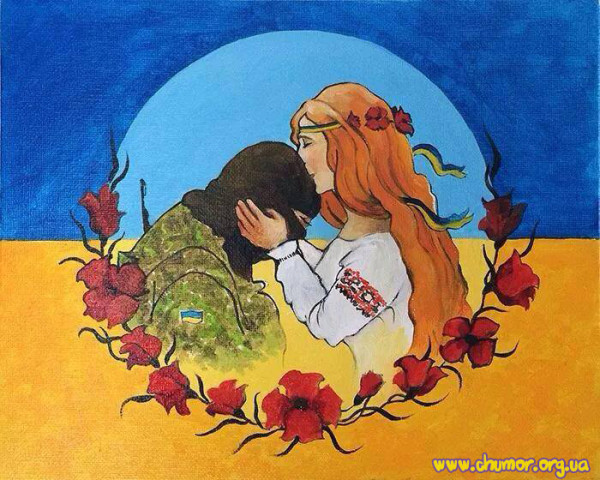We are living in a state of war. Two armies have met at the border between Ukraine and the Russian Federation: one is planning aggression against our country, while the other army braces itself to defend this same country from foreign invasion.
The army of the Russian Federation is enormous, totaling some tens of thousands of combat ready soldiers.
They have been supplied with every necessity imaginable: reliable food supplies; clothing and uniforms appropriate for the conditions at hand; modern weapons of warfare, tanks, artillery, aircraft, and field hospitals ready for any eventuality. These are individuals who have arrived at the front anticipating all its potential dangers, but at the same time they have been reassuring their families back home. Media outlets report on their activities in the manner they have deemed appropriate for the circumstances.
By contrast, the Ukrainian side is not as well supplied.
Nonetheless, the above description does not encompass all the essential elements that guarantee military success.
Simply stated, the Russian armed forces lack inspired ideas. They show their willingness to initiate any front-line activity anywhere their government commands them, but they don’t know why they are fighting there, as was the case, for example, in Chechnya or Afghanistan.
It is well known that in the past our government leadership purposely squandered our armed forces, diminishing what was available at the time for the adequate defence of the country. Consequently, as was confirmed by the experience that began six months ago when the violence in Eastern Ukraine first started, our army was found to be in a disgraceful state, lacking both equipment and properly trained regiments.
Initially, it appeared as though the Russian side would be guaranteed the victory, while the Ukrainians would be doomed to defeat. Unexpectedly, however, whether for citizens of Ukraine or of other countries, and most especially for the aggressor, the number of Ukrainian defenders grew; compared with the start of hostilities, there appeared more and more soldiers willing to train, organize, and defend Ukraine.
Strengthened by the power of prayer, ordinary citizens took the initiative to secure various types of military equipment, foodstuffs, and clothing; likewise, volunteer specialists have tended to the medical needs of the wounded.
Six months ago, in comparison with the enemy, we had a large population but a weak armed forces unprepared to fulfill its mandate, namely the defence of the population. Today, by contrast, Ukrainians have proven that they are willing and able to defend themselves, and have had to do so mostly on their own.
What has been the secret?
Our people have been nourished by the idea of love for one’s nation.
The generosity of our citizens has made it possible for countless numbers of others to take up arms in defence of their rights.
In addition, behind these brave individuals stand millions more who feel a common zeal and who express a common goal in many different and ingenious ways; they have been prepared to find ways of obtaining whatever might be temporarily lacking.
In some mysterious way, the war that should have led to our ruin has become the source of our spiritual and material growth. We now have hope that military victory is possible, and perhaps more importantly, that our profound desire, shared by so many, to be a normal, authentically independent country, might soon become true.
What has made the difference for us is that we really are a nation with inspiring ideas.
The fostering of such an idea, together with our sincere desire to live by it, following a decades-long struggle, is made possible by an inner strength that was once described by the poet, Ivan Kotliarevsky, empowering us even through the most difficult of experiences: “Where love for country does prevail, the might of evil is of no avail; the heart is stronger than the gun.”
Lubomyr, Major Archbishop Emeritus


